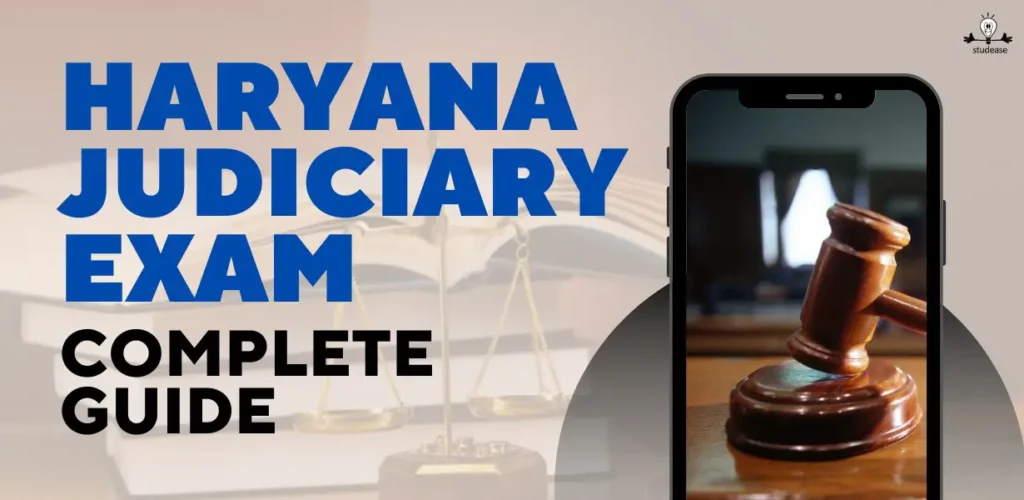
INTRODUCTION:
The Haryana State Judiciary is the judicial system responsible for administering justice within the state of Haryana, India. It comprises various levels of courts, including the High Court of Punjab and Haryana, district courts, and subordinate courts, ensuring the fair adjudication of legal disputes and upholding the rule of law.
The specific details regarding the syllabus for the Haryana State Judiciary Exam may vary slightly based on updates or revisions made by the conducting authority. However, I can provide you with a general overview of topics typically included in such exams:

Syllabus
The Constitution of India:
- Understanding the Preamble and its significance.
- Detailed knowledge of Fundamental Rights, including their nature, scope, and recent judicial interpretations.
- Directive Principles of State Policy and their role in governance.
- Fundamental Duties and their importance in promoting a sense of responsibility among citizens.
- Structure and functioning of the Executive, Legislature, and Judiciary.
- Amendment Process and landmark amendments to the Constitution.
Code of Civil Procedure (CPC):
- Understanding the jurisdiction of various civil courts, including territorial and pecuniary jurisdiction.
- Knowledge of pleadings, written statements, and framing of issues.
- Procedures for trial, including examination of witnesses and documentary evidence.
- Decrees, judgments, and orders passed by civil courts.
- Appellate procedures and principles governing civil appeals.
Code of Criminal Procedure (CrPC):
- Provisions related to arrest, bail, and bonds.
- Different types of charges and their framing.
- Procedures followed in trial of warrant cases by magistrates.
- Sentencing principles and post-conviction remedies.
- Appeals and revisions in criminal cases.
Indian Penal Code (IPC):
- Understanding general exceptions to criminal liability.
- Principles of joint and constructive liability.
- Detailed study of various offenses against property and persons.
- Recent amendments and judicial interpretations of IPC provisions.
- Special provisions relating to public servants, women, and children.
Indian Evidence Act:
- Concepts of relevancy, admissibility, and weight of evidence.
- Burden of proof and its significance in civil and criminal cases.
- Rules governing examination-in-chief, cross-examination, and re-examination of witnesses.
- Provisions relating to documentary and expert evidence.
- Recent judicial pronouncements on evidentiary matters.
Haryana Rent Control Act:
- Definitions of key terms and interpretations.
- Rights and obligations of landlords and tenants.
- Procedures for rent fixation and eviction.
- Jurisdiction of Rent Control Authorities.
- Recent amendments and case laws related to rent control.
Transfer of Property Act:
- Understanding the various modes of transfer of immovable property.
- Rights and liabilities of transferor and transferee.
- Special provisions relating to leases, mortgages, and gifts.
- Recent developments in property law and judicial interpretations.
Limitation Act:
- Different limitation periods for filing civil suits and appeals.
- Computation of limitation periods.
- Principles of condonation of delay.
- Recent judicial decisions on the application of limitation provisions.
Specific Relief Act:
- Understanding contracts and specific performance.
- Remedies available for breach of contract.
- Recovery of possession of immovable property.
- Recent case laws on specific performance and injunctions.
Haryana Urban (Control of Rent and Eviction) Act:
- Detailed study of rent control measures and their application.
- Procedures for eviction of tenants.
- Jurisdiction and powers of Rent Control Authorities.
- Recent amendments and significant judgments under the Act.
Family Laws:
- Hindu Marriage Act provisions related to marriage, divorce, and maintenance.
- Hindu Succession Act provisions governing succession and inheritance.
- Guardians and Wards Act provisions regarding guardianship and custody.
- Recent judicial interpretations and legislative changes in family laws.
Local Laws of Haryana:
- Haryana Panchayati Raj Act provisions governing local self-government.
- Haryana Municipal Act provisions related to municipal administration.
- Haryana Land Revenue Act provisions regarding land revenue administration.
- Recent amendments and significant judgments related to local laws.
General Knowledge:
- Current Affairs covering national and international events.
- Indian History including ancient, medieval, and modern periods.
- Geography of India and Haryana state.
- Indian Polity including the structure of government and recent constitutional developments.
- Indian Economy including major economic policies and recent economic indicators.
Candidates should focus on in-depth study, regular practice, and staying updated with recent legal developments and current affairs to excel in the Haryana State Judiciary Exam. Additionally, referring to previous years’ question papers and mock tests can provide valuable insights into the exam pattern and help in better preparation.

CONCLUSION:
The Haryana State Judiciary plays a crucial role in upholding justice and maintaining the rule of law within the state. With its dedicated judges and efficient judicial processes, it ensures the fair resolution of disputes and contributes to the overall welfare and development of Haryana.
For the Detailed Syllabus: CLICK HERE
To know about other exams: CLICK HERE
